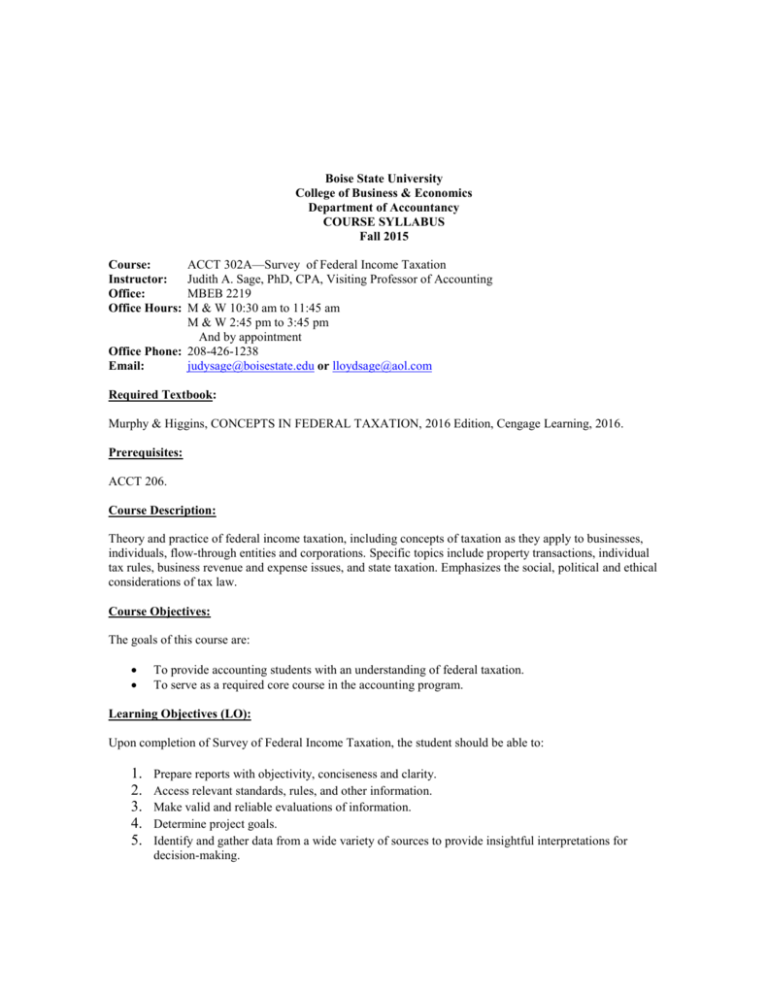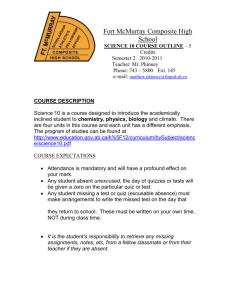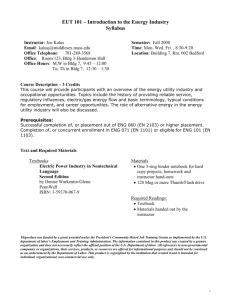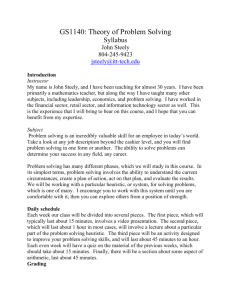ACC 443 FEDERAL INCOME TAXATION
advertisement

Boise State University College of Business & Economics Department of Accountancy COURSE SYLLABUS Fall 2015 Course: Instructor: Office: Office Hours: ACCT 302A—Survey of Federal Income Taxation Judith A. Sage, PhD, CPA, Visiting Professor of Accounting MBEB 2219 M & W 10:30 am to 11:45 am M & W 2:45 pm to 3:45 pm And by appointment Office Phone: 208-426-1238 Email: judysage@boisestate.edu or lloydsage@aol.com Required Textbook: Murphy & Higgins, CONCEPTS IN FEDERAL TAXATION, 2016 Edition, Cengage Learning, 2016. Prerequisites: ACCT 206. Course Description: Theory and practice of federal income taxation, including concepts of taxation as they apply to businesses, individuals, flow-through entities and corporations. Specific topics include property transactions, individual tax rules, business revenue and expense issues, and state taxation. Emphasizes the social, political and ethical considerations of tax law. Course Objectives: The goals of this course are: To provide accounting students with an understanding of federal taxation. To serve as a required core course in the accounting program. Learning Objectives (LO): Upon completion of Survey of Federal Income Taxation, the student should be able to: 1. 2. 3. 4. 5. Prepare reports with objectivity, conciseness and clarity. Access relevant standards, rules, and other information. Make valid and reliable evaluations of information. Determine project goals. Identify and gather data from a wide variety of sources to provide insightful interpretations for decision-making. ASSIGNMENT SCHEDULE Due Date Aug. 24 Assignments Read Chapter 1 (p1-18 to 1-23 & p1-26 to 1-29) – Federal Income Taxation—An Overview; Read Chapter 8 (omit p8-8 to 8-20) – Taxation of Individuals; Read page 4-18; Pr. 8-30, 8-32, 8-33, Assignment # 1 8-31, 8-35, Assignment #2; Read Chapter 3 (omit p3-33 to 3-36) – Income Sources LO 2,3,5 2 8-62, 8-63, 8-64, 3-35, 3-37, 3-57, 3-58, 3-81, 3-82, Assignment #3; Read Chapter 4 – Income Exclusions; Read p1-16 to 1-17 3-39, 3-41, 3-42, 3-51, 4-57; Quiz #1 (Chapters 1,8,3), Read p6-2 to 6-5 7 9 Labor Day—No Class 4-49, 4-53, 3-49, 3-54, Assignment #4, Research Case #1 26 31 Sept. Oct. Nov. 2,3,5 2,3,5 2,3,5 2,3,5 14 16 Assignment #5; Read Chapter 9 – Acquisitions of Property 9-57, 9-64, Assignment #6; Quiz #2 (Chapters 3 & 4); Read Chapter 12 – Nonrecognition Transactions; Read p3-25 to 3-27 2,3,5 2,3,5 21 23 12-24, 12-26, 12-28, 12-31, 12-46, 12-50, 12-51, 12-53, 12-54, Assignment #7 Assignment #8; Read Chapter 11 – Property Dispositions; Read p1-11 to 1-17 2,3,5 2,3,5 28 30 11-34, Assignment #9; Quiz #3 (Chapters 9 & 12) Assignment #10 2,3,5 2,3,5 Assignment #11; Read p3-33 & 3-34 Assignment #12; Read Chapter 5 – Introduction to Business Expenses; Read Chapter 6 – Business Expenses 2,3,5 2,3,5 12 14 Exam I (Chapters 1, 3, 4, 8, 9, 11, 12) 5-37, Assignment #13; Read p8-8 to 8-20; Project #1 2,3,5 1,2,3,5 19 21 6-35, 8-42, 8-49, Assignment #14: Review Exam I 8-60, Assignment #15; Read Chapter 10 – Cost Recovery on Property: Depreciation, Depletion, and Amortization; Quiz #4 (Chapters 5 & 6) 2,3,5 2,3,5 26 28 10-56, Assignment #16; Read p6-12 to 6-15; Read p7-4 to 7-6; Read p7-19 to 7-22 Assignment #17; Quiz #5 2,3,5 2,3,5 2 Assignment #18; Read p7-9 to 7-19; Read p8-22 to 8-30; Read Chapter 15 (p15-24 to 15-37) – Choice of Business Entity—Other Considerations 15-71, 15-72, 15-77, 15-78, 8-65, Assignment #19; Read §41(c)(2) and §469(i); Quiz #6 2,3,5 5 7 4 9 11 8-73, Assignment #20; Read p15-2 to 15-23 Exam II 16 15-49, 15-50, 15-51, 15-53, 15-54, 15-59, 15-64, 15-65, 15-66, 15-67, 15-68, 15-69, Assignment #21 Research Day 18 1,2,3,4,5 2,3,5 1,2,3,4,5 Due Date Nov. 23 25 Dec. 30 2 7 9 14 Assignments Thanksgiving Vacation—No Class Thanksgiving Vacation—No Class LO Research Case 2 Presentations Research Case 2 Presentations 1,2,3,4,5 1,2,3,4,5 Assignment #22; Review Exam II; Tax Return Problem Tax Return Problem 2,3,5 2,3,5 Final Exam, 12:00 pm to 2:00 pm Withdrawal Deadline: It is the responsibility of the STUDENT to drop the course before the drop date. Faculty are not responsible for dropping students who suspend class attendance. The last day to withdraw from the course without a W is Friday, September 4, 2015. The last day to withdraw from the course with a W is Friday, October 30, 2015. Accommodations for Disabilities: Students with disabilities needing accommodations to fully participate in this class should contact the Disability Resource Center (DRC). All accommodations must be approved through the DRC prior to being implemented. To learn more about the accommodation process, visit the DRC’s website at http://drc.boisestate.edu/new-drc-students/. Classroom Behavior: Classroom discussion and academic debate are encouraged as an essential intellectual activity. It is essential that students learn to express and defend their beliefs, but it is also essential that they learn to listen and respond respectfully to others whose beliefs they may not share. Diverse, unorthodox, and unpopular points of view will always be tolerated, but it will not tolerate condescending or insulting remarks. When students verbally abuse or ridicule and intimidate others whose views they do not agree with, they subvert the free exchange of ideas that should characterize a university classroom. If their actions are deemed by the professor to be disruptive, they will be subject to appropriate disciplinary action, which may include being involuntarily withdrawn from the class. Religious Accommodation: The university is composed of a diverse student body who have a number of different religious beliefs. Reasonable accommodations will be made to allow students to practice their beliefs. It is the responsibility of the student to inform the instructor in advance when there is a conflict between scheduled classroom activities (examinations, quizzes, etc.) and religious holidays. Overall Course Objectives: This course has been designed to meet two overall objectives. The first objective is to assist you to learn the knowledge and skills that will prepare you for a competitive job market. The second objective is to prepare you for a successful career in accounting and/or taxation. Upon completion of Survey of Federal Income Taxation, the student should be able to: ---------------------------------------- Understand and apply the components of the Federal income tax formula. Use the proper method for determining the tax liability. Understand the concepts of gross income and realization. Identify the circumstances under which various items are excludable from gross income. Differentiate between deductions for and from adjusted gross income. Determine bad debt deduction, loss deductions and casualty and theft losses. Understand tax depreciation, depletion, and amortization methods. Recognize the deductible transportation, travel, entertainment, moving and self-employed expenses. Recognize the deductible tax, medical, interest, contributions, and other itemized deductions. Understand the use and calculation of tax credits. Understand the computation of recognized gain or loss on property dispositions. Determine long-term and short-term capital gains and losses. Determine alternative minimum tax. ---- Understand contributions to and distributions from retirement plans. Methods of Instruction: This class is conducted using a combination of discussion, problem-based learning and cooperative learning techniques. Discussion is used to clarify and expand upon information in the textbook. Problem-based learning provides the student with the opportunity to use critical thinking to solve accounting situations. Homework assignments are thoroughly discussed to the extent time allows. Students are expected to prepare solutions to the homework assignments before coming to class. Cooperative learning provides an opportunity to learn critical team skills. Problem-Based Learning: Problem-based learning (PBL) reflects the way people learn in real life. According to Barrows (1986) in “A Taxonomy of Problem-Based Learning Methods” the goals of PBL are: 1. Structure knowledge for use in working context – PBL is concerned with constructing knowledge that is to be put to work. 2. Developing effective reasoning processes – PBL comprises the cognitive activities required in the professional area concerning and including problem-solving, decision-making, hypothesizing, etc. 3. Developing self-directed learning skills – PBL involves generic study skills, content-specific study skills, and self-management skills (i.e., “lifelong learning”). Biggs (2003) in Teaching for Quality Learning at University states that PBL-taught students use the knowledge that they have more effectively with richer reasoning chains; they have greater self-awareness and self-direction than traditionally taught students. Cooperative Learning: Every member of a team brings different skills to the solution of problems. Accountants are important members of the team but they must be able to work in teams. D. W. John, R. T. Johnson, and K. A. Smith's 1991 book, Active Learning: Cooperation in the College Classroom mentioned the following elements of cooperative learning: Positive Interdependence is recognition that you cannot succeed unless other members of the group also succeed. The group should agree on its solution and each member should fulfill his or her own role. Face-to-face Promotive Interaction exists when students orally explain to each other how to solve problems, discuss concepts and strategies being learned, teach their knowledge to classmates and explain the connection between today's learning and earlier learning. The word promotive implies that students help, assist, and encourage each other's efforts to learn. Individual Accountability/Personal Responsibilities means that your performance in this course will be based primarily on your individual performance on quizzes, examinations and projects. Collaborative Skills means that students exercise leadership, decision-making, trust-building, communication, and conflict-management skills. Another reason for using cooperative learning is that it is important to increase your retention of the materials you learn. There are many studies that document the fact that students do not retain much over time from traditional lecture teaching methods. Students who participate in classroom activities retain much more over time. AICPA Core Competencies: The accounting profession has indicated that all accountants entering into the profession should possess all elements of the AICPA Core Competencies. The research cases, project, graded assignments, homework assignments and class participation are all designed to maximize the number of elements of the AICPA Core Competencies to be accomplished in this course. Learning: With much to learn in this class, you must accept primary responsibility for your own learning. The role of the instructor is to design a course and manage the overall instruction process. However, you must accept the responsibility for learning some basic ideas before each class session. In particular, you will be responsible for gaining the first three levels of knowledge in Bloom's Taxonomy of Knowledge before class. The higher levels will be worked on in class. Levels of Knowledge (Adapted from Bloom's Taxonomy): 1. 2. 3. 4. 5. 6. Knowledge--Be capable of recalling words, facts, dates, conventions, classifications, principles, theories, etc. Comprehension--Be capable of transposing, interpreting and extrapolating from a certain body of knowledge. Application--Be capable of remembering knowledge or principles in order to solve problems. Analysis--Be capable of identifying the elements, relationships, and organizational principles of a situation. Synthesis--Be capable of accomplishing a personal task after devising a plan of action. Evaluation--Be capable of making a critical judgment based on internal and external criteria. To reiterate, you are responsible for your learning. You will learn items at the first three levels before class by studying your reading assignments, the examples, and assigned problems. These are the foundation for higher levels of learning, which you will achieve in the class sessions. Exams: When exams are returned, total points to date will be given and a letter grade indicated as if grades were determined at that point in the course. Absence from an exam must be approved by the instructor in advance. Generally, make-up exams will not be given and an unapproved absence will result in a zero on the exam. Quizzes and Homework: There will be six quizzes given over reading and homework assignments. The lowest quiz score for the term will be dropped in the calculation of total points. Absence from a quiz must be approved by the instructor in advance. Generally, make-up quizzes will not be given and an unapproved absence will result in a zero on the quiz. Students are expected to have homework assignments completed by the beginning of each class. All homework assignments will be collected on their due dates. Late homework assignments will be given two points each. Xerox copies of homework assignments will not be accepted. Changes in Syllabus: The instructor reserves the right to change or adjust any part of this syllabus as circumstances necessitate. All changes will be announced in class. Grade Determination: Quizzes (35 points each) --------------------------------------------------------Exam I ------------------------------------------------------------------------------Exam II -----------------------------------------------------------------------------Final Exam ------------------------------------------------------------------------Project -----------------------------------------------------------------------------Research Case 1 ------------------------------------------------------------------Research Case 2 ------------------------------------------------------------------Homework Assignments (3 points per assignment) ------------------------Tax Return Problem--------------------------------------------------------------Class Participation----------------------------------------------------------------Total points -------------------------------------------------------------The course grade will be based on total points using a modified curve. 175 100 100 100 25 15 60 66 10 39 690 College of Business and Economics Core Curriculum Student Learning Goals and Objectives Students in this class will learn or practice the following COBE Core Curriculum concepts, methods, and skills: 1. Understand and apply analytical and disciplinary concepts and methods related to business and economics: 1.1. Accounting 2.1. Communicate effectively: Write messages and documents that are clear, concise, and compelling 2.2. Communicate effectively: Give oral presentations that use effective content, organization, and delivery 3. Solve problems, including unstructured problems, related to business and economics 4. Use effective teamwork and collaboration skills 1.7. Legal environment of business 5. Demonstrate appropriate principles of responsible business practices 5.1 Resolve issues related to Individual Responsibility (Business Ethics) 5.2 Resolve issues related to Corporate Social Responsibility 5.3 Resolve issues related to Leadership Responsibility (Corporate Governance) 5.4 Resolve issues related to Environmental Responsibility (Environmental Sustainability) 5.5 Resolve issues related to Cultural Responsibility (Diversity)





